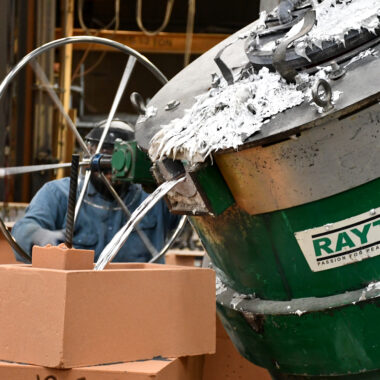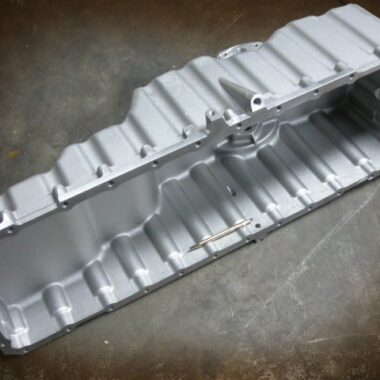Casting Aluminum 101: Vital Actions for Novices
Casting Aluminum 101: Vital Actions for Novices
Blog Article
Aluminum Spreading Solutions Unveiled: Crucial Insights and Tips
Checking out the realm of aluminum spreading services can reveal a world of detailed processes and nuanced factors to consider that are vital for successful end results. As industries increasingly turn to aluminum for its lightweight yet resilient homes, comprehending the essentials of casting becomes vital. From the fundamental techniques to the intricate information that can make or damage a casting project, there is a riches of insights and pointers waiting to be found. So, as we venture right into the realm of light weight aluminum spreading services, prepare to reveal the essential components that can form the trajectory of your projects and raise your understanding of this intricate craft.
The Basics of Aluminum Casting
What basic procedures are involved in aluminum spreading that create the backbone of this extensively made use of production strategy? Light weight aluminum spreading is a versatile and affordable method used in various industries to create complicated and complex steel elements. The process begins with the melting of aluminum ingots in a heater, typically at temperatures varying from 1220 ° F to 1670 ° F, relying on the certain aluminum alloy being used. Once molten, the light weight aluminum is put into a pre-designed mold dental caries, where it takes the shape and strengthens of the mold.
Trick aspects such as mold layout, gating system, and cooling price play a vital role in establishing the final top quality of the cast aluminum component. The mold can be constructed from different products like steel, financial investment, or sand casting wax, depending on the ins and out of the part and the preferred surface finish. After solidification, the mold and mildew is removed, and the spreading undergoes completing procedures such as heat treatment, surface area, and machining layer to satisfy the called for requirements. Comprehending these basic processes is necessary for achieving premium light weight aluminum castings with accurate measurements and mechanical residential properties.
Different Casting Techniques Clarified
Discovering the various methods employed in aluminum casting supplies important understandings right into the diverse methods used to attain detailed and precise metal parts. One usual method is sand casting, where a mold is created utilizing compressed sand around a pattern of the desired part. Another technique, pass away spreading, entails infusing liquified aluminum into a steel mold under high pressure.
Elements to Think About When Selecting a Provider
When selecting an aluminum casting service supplier, examining their experience and proficiency is essential for making sure top quality and reliability in the production procedure. The copyright's experience in the area shows their knowledge with various spreading methods, prospective difficulties, and finest methods. It is vital to ask about the kinds of tasks they have actually worked with in the past, ensuring they align with the complexity and requirements of your very own job.
Additionally, take into consideration the supplier's track record within the industry. Look for testimonials, testimonies, and study that show their ability to supply premium aluminum spreadings regularly. A reliable copyright will often have qualifications or affiliations with market organizations, showcasing their commitment to quality and adherence to market criteria.
Additionally, analyze the company's capabilities in terms of modification, volume demands, and task timelines. Guarantee that they can suit your particular demands and have the flexibility to scale manufacturing as required. Efficient interaction and openness concerning expenses, preparation, and quality control processes are additionally crucial aspects to take into consideration when choosing an aluminum spreading company.

Common Challenges and Solutions
Browsing through the complexities of light weight aluminum casting procedures frequently offers manufacturers with a collection of obstacles that need cutting-edge options to ensure effectiveness and quality in production. One usual challenge dealt with in light weight aluminum spreading is the formation of problems such as porosity, contraction, or inclusions due to incorrect mold and mildew layout or inadequate metal top quality.
Another challenge depends on attaining precise dimensional accuracy, particularly for complicated geometries. Variants in cooling down rates, mold growth, and material properties can lead to discrepancies from the designated measurements. Implementing advanced innovations like computer-aided style (CAD) and computer system mathematical control (CNC) machining can boost precision and uniformity in light weight aluminum spreading. In addition, keeping appropriate control over the melting and putting procedures is crucial to stop concerns like overheating or uneven distribution of the molten steel - casting aluminum. By purchasing automation and real-time monitoring systems, producers can enhance process control and reduce variations, ultimately enhancing the overall quality of light weight aluminum actors items.
Tips for Optimizing Your Spreading Projects
To improve the efficiency and top quality of your light weight aluminum casting jobs, implementing critical optimization methods is vital. One essential tip for maximizing your casting projects is to meticulously create the gating system. By making certain that the gating system is properly designed and appropriately placed, you can boost the flow of liquified aluminum and lower the possibilities of defects in the final spreading. Furthermore, making use of computer simulations can aid in anticipating and analyzing the flow of steel during the spreading process, permitting adjustments to be made prior to real production starts.

Final Thought
In verdict, understanding the fundamentals of light weight aluminum casting, different spreading approaches, elements to think about when picking a company, usual challenges and solutions, and pointers for enhancing spreading jobs are necessary for effective results. By sticking to these insights and executing finest companies, methods and individuals can make sure reliable and effective light weight aluminum spreading solutions that satisfy their certain requirements and demands.
Comprehending these essential processes is vital for accomplishing premium aluminum castings with precise dimensions and mechanical residential or commercial properties.
When selecting a light weight aluminum spreading service company, evaluating their experience and proficiency is crucial for ensuring top quality and dependability in the manufacturing process. Reliable communication and transparency pertaining to expenses, lead times, and quality control procedures are additionally important elements to take into consideration when selecting an aluminum casting service provider.
Browsing with the intricacies of light weight aluminum casting procedures commonly provides manufacturers with a collection click now of challenges that call for innovative remedies to make sure efficiency and high quality in manufacturing. One common challenge encountered in aluminum casting is the formation of defects such as porosity, shrinking, or incorporations due to inappropriate mold and mildew style or poor metal quality.
Report this page